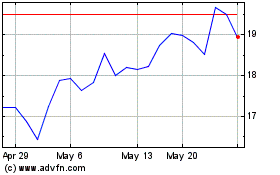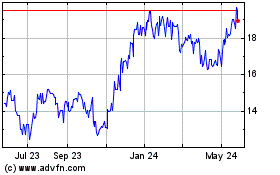Stocks, Treasury Yields and Pound Fall as Investors Turn Cautious
06 July 2016 - 7:41AM
Dow Jones News
By Riva Gold and Akane Otani
U.S. stocks slumped, reversing course after their biggest weekly
gain of the year, as crude-oil prices tumbled and government-bond
yields plumbed record lows.
After initial losses following the U.K. vote to leave the
European Union, global stocks rebounded last week, with the S&P
500 and the Dow Jones Industrial Average both climbing more than
3%. Major U.S. indexes pared those gains Tuesday, with some
investors and analysts saying markets weren't yet clear of the
fallout.
Investors sold risky assets like commodities in favor of havens
like Treasury bonds. The yield on the 10-year U.S. Treasury note
settled at a record low of 1.367%, U.S. crude oil dropped 4.9%, to
$46.60 a barrel, and gold settled at its highest level since March
2014, up 1.5%, to $1,356.40 a troy ounce.
"It definitely feels like the markets woke up on the wrong side
of the bed this morning," said Jason Bloom, director of research
and strategy for commodities and alternatives at PowerShares.
"Crude oil tends to be the epicenter of the global risk-off
sentiment."
The Dow industrials fell 108.75 points, or 0.6%, to 17840.62.
The S&P 500 declined 14.40 points, or 0.7%, to 2088.55, and the
Nasdaq Composite Index lost 39.67 points, or 0.8%, to 4822.90.
Shares of commodity-linked companies led the day's losses.
The energy sector in the S&P 500 fell 1.9%. Southwestern
Energy declined $1.35, or 10%, to $11.66, and Murphy Oil dropped
$2.57, or 7.9%, to $30.09.
Oil prices were pressured by data from Friday that showed the
number of U.S. rigs drilling for oil increased in the past week, as
well as the strengthening dollar, which makes dollar-traded oil
more expensive for foreign buyers. The WSJ Dollar Index advanced
0.7%.
The index's financial sector, which fell sharply in the wake of
the U.K. vote, lost 1.5%. J.P. Morgan Chase fell 1.71, or 2.8%, to
59.55, and Goldman Sachs Group declined 3.80, or 2.6%, to 144.45,
making them among the biggest decliners in the Dow industrials.
With questions lingering about global growth, the U.K.'s future
relationship with the EU, and politics abroad, U.S. assets like the
dollar and the 10-year Treasury look relatively attractive at the
moment, said Jon Adams, senior investment strategist for BMO Global
Asset Management.
"Uncertainty about policy is clearly driving the markets right
now," Mr. Adams said.
The British pound slumped to a 31-year-low against the dollar.
The FTSE 100 index, whose shares have benefited from a weaker
pound, gained 0.4%. The Stoxx Europe 600 fell 1.7%.
Japan's Nikkei Stock Average fell 0.7%, snapping a six-session
winning streak as the yen climbed against the dollar.
Hong Kong's Hang Seng Index fell 1.5%, while Australia's
S&P/ASX 200 index dropped 1% after the central bank left its
cash rate unchanged. The Shanghai Composite Index gained 0.6%.
Some analysts cautioned against becoming overly pessimistic
about the global economy as a result of U.K. vote. Investors
shouldn't necessarily "get too concerned about global growth just
because the U.K. is slowing, " said Michael Metcalfe, head of macro
strategy at State Street Global Markets.
A more meaningful slowdown from the Brexit vote would likely
require possible political contagion in the eurozone or an
acceleration of concerns about eurozone banks, Mr. Metcalfe
said.
Write to Riva Gold at riva.gold@wsj.com
(END) Dow Jones Newswires
July 05, 2016 17:26 ET (21:26 GMT)
Copyright (c) 2016 Dow Jones & Company, Inc.
Taylor Wimpey (PK) (USOTC:TWODY)
Historical Stock Chart
From Jan 2025 to Feb 2025

Taylor Wimpey (PK) (USOTC:TWODY)
Historical Stock Chart
From Feb 2024 to Feb 2025
